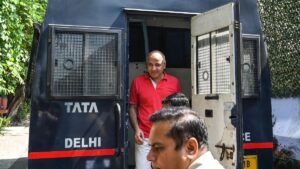ButSpeak.com
News which Matters.

The Supreme Court grants bail to ex-Delhi Deputy CM Manish Sisodia after 18 months, emphasizing the right to a speedy trial and condemning indefinite incarceration without trial.
Manish Sisodia, the former Deputy Chief Minister of Delhi, was granted bail by the Supreme Court on Friday morning, nearly 18 months after his arrest by the Central Bureau of Investigation (CBI) in the alleged liquor policy case. The court’s decision comes as a powerful reminder of the importance of the right to a speedy trial, a fundamental liberty guaranteed by the Indian Constitution.
The Supreme Court, in its verdict, highlighted that denying Sisodia bail at this stage would compel him to navigate a lengthy and cumbersome legal process, likening it to “making him play snakes and ladders.” The bench, comprising Justice BR Gavai and Justice KV Viswanathan, underscored that a citizen should not be forced to “run from pillar to post” in matters of life and liberty, which are among the most sacrosanct rights.
Sisodia was first arrested by the CBI on February 26, 2023, followed by a second arrest by the Enforcement Directorate just weeks later. Despite the severity of the charges, the Supreme Court expressed its discontent with the prolonged period of his detention, particularly given that the trial has not even commenced. The bench stated that keeping the Aam Aadmi Party leader in jail for an “unlimited time” without trial was a violation of his fundamental rights.
Justice Gavai pointed out that incarceration for 18 months, without the trial even starting, deprives the accused of the right to a speedy trial. He questioned the lower courts for their failure to give due consideration to this principle, reminding them that “bail is the rule and jail is an exception.” The Supreme Court further stressed that bail should not be used as a form of punishment, a principle that had been overlooked in Sisodia’s case.
The court also scrutinized the federal agencies’ handling of the case, with Justice Gavai noting that 493 witnesses had been named, making it unlikely that the trial would conclude anytime soon. During the hearing, the court asked Additional Solicitor General SV Raju to realistically estimate when the trial might begin. Raju suggested that the trial could commence within a month of the framing of charges, but this failed to convince the court, which was concerned about the prolonged delays.
Regarding concerns over evidence tampering, the court pointed out that most of the evidence is documentary and already in the possession of the investigating agencies. Nonetheless, the court has imposed strict conditions on Sisodia’s bail, including the surrender of his passport and a requirement to report to the Investigating Officer every Monday. The court also warned that any attempt to tamper with evidence would result in Sisodia being sent back to jail.
This ruling marks a significant moment in the ongoing legal saga surrounding the Delhi liquor policy case, as it reinforces the judiciary’s commitment to upholding constitutional rights, even in complex and high-profile cases.